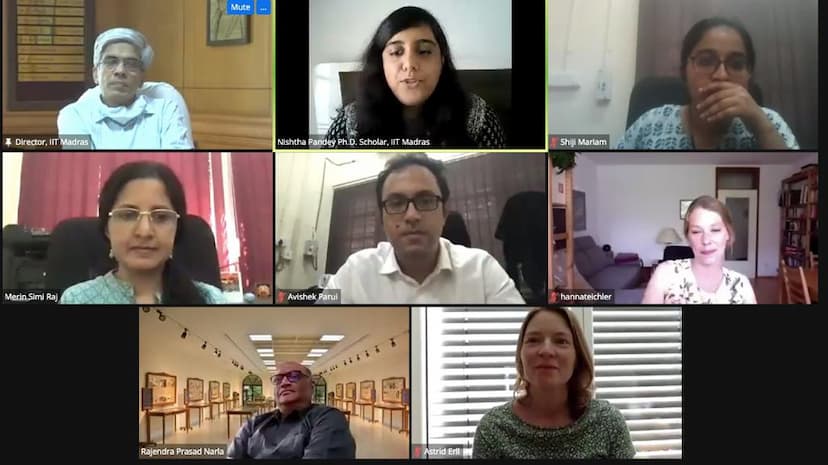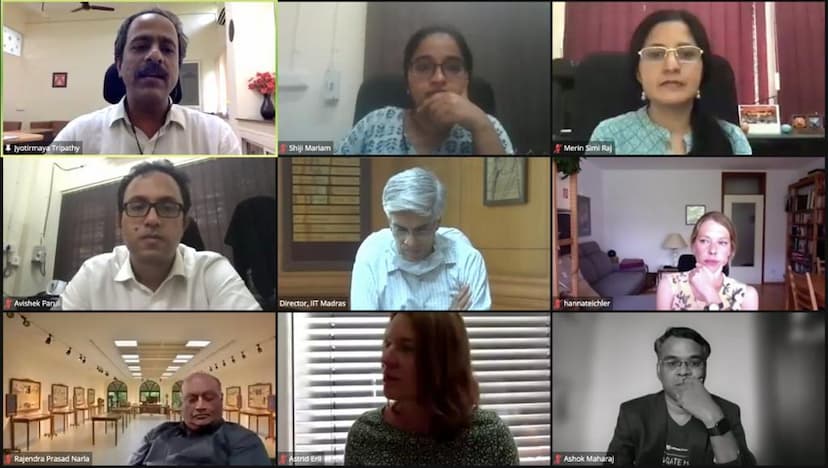INMS of IIT Madras: Great Indian network for memory studies

INMS of IIT Madras is the first formal national network in the field of memory studies in India and Asia.
INMS (Indian Network for Memory Studies) was launched by IIT Madras and has been formed under the aegis of the international Memory Studies Association (MSA) in Amsterdam.


INMS of IIT Madras will coordinate complex engagements with memory from different institutes including cultural studies centres as well as neuroscience laboratories and industry research on Artificial Intelligence (AI) and related fields.
The inauguration for the network (INMS of IIT Madras) was held virtually on 16 June virtually amidst a participation of over 600 persons from India, Iraq, Finland, France, Germany, Mauritius, Sweden, U.K. and USA.
Dr. Avishek Parui and Dr. Merin Simi Raj are the founders of INMS of IIT Madras.

INMS of IIT Madras
They are Assistant Professors (English), Department of Humanities and Social Sciences, IIT Madras, who will also be its Chairpersons.
Dr. Parui is also a nominated member of the Advisory Board of the International Memory Studies Association.
INMS of IIT Madras has emerged from the Centre for Memory Studies located at IIT Madras, which has been funded by the Ministry of Education, Government of India.

The other funding to the current projects in this research cluster comes from XR Lab, TCS Chennai, and Anglo-Ink, Chennai.
Speaking at the event to inaugurate INMS of IIT Madras, Professor Bhaskar Ramamurthi said ‘I wish this effort a speedy success.’
Professor Bhaskar Ramamurthi is the director of IIT Madras.
INMS of IIT Madras has already built a commendable critical mass which reflects its relevance and reach success in this case will be to get the activities going, establish lot of collaborations, conferences, workshops and form a community of people working in this field, said Professor Bhaskar Ramamurthi.

Read More – Easiest exams in India

Professor Bhaskar Ramamurthi further said the fact that there are so many participants from India too has shown that this network has not come a day too soon.
There is enough work going on in India to warrant the creation of such a Network.
There is a good base for creating this network in India and it can plug into the huge global network, said IIT Madras director.
The vision for INMS of IIT Madras include:
Ø Offering an India-centric model of memory studies departing from the established Eurocentric models in theory and practice.
Ø Producing and promoting an innovative interdisciplinary engagement with the complex cognitive, cultural, and machinic modes of memory.
Ø Examining the processes of encoding and effacement that simultaneously inform acts of remembrance and re-construction in private as well as shared orders, and how such processes may be recorded as well as represented by a range of fields such as fiction, history, media, urban geography, and technology.
Ø Producing exhibitions, conferences, workshops, and special journal issues on a range of themes in Memory Studies, in collaboration with partners from academia and industry.

Ø Re-creating Indian and South-Asian pre-colonial, colonial, and postcolonial events and identities using the model of memory as reconstruction, foregrounding the textuality and the technology informing processes of remembering.
Speaking on ‘The Pleasures of Memory Studies,’ Professor Astrid Erll, Goethe-Universität Frankfurt, Director, Frankfurt Memory Studies Platform, identified the pleasures of memory studies in its ‘internationality,’ ‘interdisciplinarity’ and ‘ongoingness.’
He spoke on how INMS of IIT Madras synthesises the tools of literary studies with newer forms of technology.
Professor Erll said his definition of memory studies would be an interplay of present, past and future in socio-cultural contexts.
Memory is a biological, social, material and cultural phenomenon and increasingly a technological phenomenon, said Professor Erll.

What has happened in the last two decades is that Memory has become more and more instutionalized, said Professor Erll.
In 2016, a group of memory scholars realized that they needed to have a global platform, he said.
‘Hence, for the past five years, we have an International Memory Studies Association to facilitate this global collaboration. MSA India is the latest entrant to this association.’
The moment turned special when Dr. Avishek Parui and Dr. Merin Simi Raj formally inagurated the official website of INMS of IIT Madras, membership form and the newsletter.
Chairperson of INMS of IIT Madras Dr. Merin Simi Raj said they are moving away from the big-event model of memory studies and instead are examining the dailyness of remembering and forgetting through the innovative incorporations of the literary as well as the technological lenses.
‘At the INMS of IIT Madras we are particularly interested on researching the Indian landscape of memory studies, and in so doing integrate the immediate, the local, and the international through an interdisciplinary theoretical lens’ he said.
INMS of IIT Madras through the research conducted at the Centre for Memory Studies would facilitate departures from Eurocentric approaches in terms of theoretical framework and worldviews.
It will also open up research and internship opportunities for Indian students as well as international scholars through an annual membership programme in collaboration with the International Memory Studies Association.
S Vishnu Sharmaa now works with collegechalo.com in the news team. His work involves writing articles related to the education sector in India with a keen focus on higher education issues. Journalism has always been a passion for him. He has more than 10 years of enriching experience with various media organizations like Eenadu, Webdunia, News Today, Infodea. He also has a strong interest in writing about defence and railway related issues.






